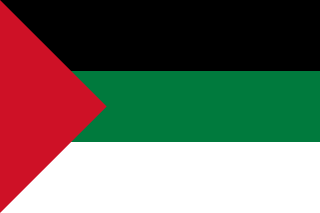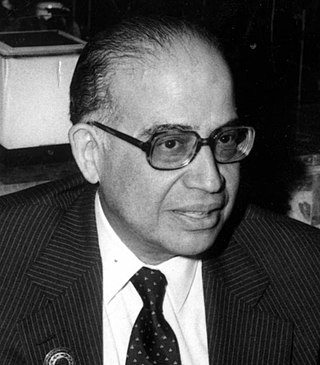
The Committee on the Exercise of the Inalienable Rights of the Palestinian People (CEIRPP) is a committee mandated by the United Nations General Assembly in order to promote the rights of the Palestinian people, support the peace process and to mobilize assistance to the Palestinian people.

The pan-Arab colors are black, white, green and red. Individually, each of the four pan-Arab colors were intended to represent a certain aspect of the Arab people and their history.

Ahmed Asmat Abdel-Meguid was an Egyptian diplomat. He served as the Foreign Minister of Egypt between 1984 and 1991, and as the Secretary-General of the Arab League from 1991 until 2001.

The Non-Aligned Foreign Ministers Conference was held in Georgetown, Guyana from 8 August to 12 August 1972.

The 1964 Arab League summit was the first summit of the Arab League, held in Cairo, Egypt, on 13–16 January 1964 and attended by all fourteen of the then member states: United Arab Republic (Egypt), Iraq, Lebanon, State of Palestine, Syria, Saudi Arabia, Jordan, Yemen Arab Republic, Libya, Sudan, Morocco, Tunisia, Kuwait and Algeria.

The 1964 Arab League summit in Alexandria was held on 11 September 1964 in Montaza Palace, Alexandria as the second Arab League Summit. The focus of the conference was to implement the plans discussed at the first Arab League summit held in January of that year. The summit was notable for being a key step in the buildup to the Six-Day War in 1967 and separately for "approving the establishment of the Palestine Liberation Organization."
Ibrahim Omar Dabbashi is a Libyan diplomat who formerly served as the Libyan Permanent Representative to the United Nations in New York. With the advent of the Libyan Civil War, Dabbashi led the country's UN mission in opposing the continued rule of Muammar Gaddafi.

The Arab Nationalist Movement, also known as the Movement of Arab Nationalists and the Harakiyyin, was a pan-Arab nationalist organization influential in much of the Arab world, particularly within the Palestinian movement. It was first established in the 1950s by George Habash with the primary focus on Arab unity.
Mohsin Ibrahim, kunya Abu Khaled, was a Lebanese politician. He was a prominent personality of the Lebanese and Arab left. Initially a Nasserist nationalist, he later turned to Marxism and became the leader of the Communist Action Organization in Lebanon (OACL). As the head of OACL, he played key roles in the building of alliances during the Lebanese Civil War.

The Socialist Federal Republic of Yugoslavia was a founding member of the Non-Aligned Movement, an international groupation established to maintain independence of countries beyond Eastern and Western Bloc from the major Cold War powers. Belgrade, the capital of Yugoslavia, hosted the First Summit of the Non-Aligned Movement in September 1961 and the Ninth Summit in September 1989.

The 18th Summit of the Non-Aligned Movement was held October 25–26, 2019 in Baku, Azerbaijan. The summit was attended by the delegation from more than 120 countries.
Egypt was one of the founding members of the Non-Aligned Movement (NAM). The preparatory meeting for the First NAM Conference in Belgrade was held in Cairo between 5 and 12 June 1961. The first NAM conference was cosponsored between President of Egypt Gamal Abdel Nasser and President of Yugoslavia Josip Broz Tito who sent joint letter to other leaders during their bilateral meeting in Egypt. Cairo hosted the Second Conference in October 1964 attended by forty-seven countries while Egyptian Red Sea resort Sharm el-Sheikh hosted the Fifteenth Conference in 2009. At the time of the Sharm el-Sheikh Conference 118 countries participated in the activities of the movement with some other countries having the observer status. 55 heads of state attended the 2009 conference. Official Egyptian state institutions view the movement as the broadest and the most important framework for developing countries to coordinate their stances on issues on the agenda of the United Nations and to act together against unilateral policies.

Third Conference of the Non-Aligned Movement on 8–10 September 1970 in Lusaka, Zambia was the third conference of the Non-Aligned Movement. A preparatory meeting of Foreign Ministers drafted a number of resolutions which were considered by the Summit Conference. President of Zambia Kenneth Kaunda opened the conference by underlining non-alignment as "the natural choice at the time of increased hostility created by ideological conflicts in the bipolar world"

Seventh Summit Conference of Heads of State or Government of the Non-Aligned Movement on 7–12 March 1983 took place in New Delhi in India, one of the founders and leading members of the Non-Aligned Movement. The summit followed the 1979 summit in Havana, Cuba at which confrontation between moderate member states led by SFR Yugoslavia and India and radical states led by Cuba led the movement into crisis. The keynote address delivered by Prime Minister of India Indira Gandhi. At the summit in New Delhi Bahamas, Barbados, Colombia and Vanuatu were admitted as new member states, Papua New Guinea, Antigua and Barbuda as observers and Dominican Republic as an guest state. Cambodia was absent from the meeting due to rival delegations controversy, Saint Lucia failed to send a delegation while Luxembourg's request for an guest status was rejected on formalistic deadline grounds. 1,500 journalists followed the event.

The Non-Aligned Movement (NAM) is a forum of 120 countries that are not formally aligned with or against any major power bloc. It was founded with the view to advancing interests of developing countries in the context of Cold War confrontation. After the United Nations, it is the largest grouping of states worldwide.
Second Summit Conference of Heads of State or Government of the Non-Aligned Movement on 5–10 October 1964 in Cairo, United Arab Republic (Egypt) was the second conference of the Non-Aligned Movement which followed the Belgrade Conference of 1961 and preceded the Lusaka Conference of 1970. The city of Cairo was selected as a host of the summit conference at the preparatory meeting held in Colombo, Ceylon, on March 23, 1964. At the beginning of the conference the chairmanship of the Movement was transferred from the President of Yugoslavia Josip Broz Tito to the President of Egypt Gamal Abdel Nasser.

The 9th Summit of the Non-Aligned Movement on 4–7 September 1989 in Belgrade, SR Serbia, SFR Yugoslavia was the conference of Heads of State or Government of the Non-Aligned Movement. Belgrade was the first city to host the Summit for the second time after it hosted the 1st Summit of the Non-Aligned Movement in 1961. Yugoslavia was unanimously selected as the host of the Summit at the 1988 Non-Aligned Foreign Ministers Conference in Nicosia, Cyprus. While the Federal Secretary of Foreign Affairs of Yugoslavia led by Budimir Lončar was excited, the Presidency of Yugoslavia, Yugoslav collective head of state, was skeptical about the prospects of hosting the event but ultimately supported it by Josip Vrhovec in fear that rejection may show the level of the crisis in the country. The comparatively weak federal government organizers of the event ultimately hoped that the conference may convince leaders of the strong Yugoslav federal republics to resolve the early Yugoslav crisis in a constructive and peaceful way, yet it nevertheless escalated in 1991 Yugoslav Wars. The event is therefore sometimes described as the swan song of the prominent Yugoslav Cold War diplomacy. Summit took place at the Sava Centar in New Belgrade. Janez Drnovšek held the opening remarks in Slovenian language.

10th Summit of the Non-Aligned Movement on 1–6 September 1992 in Jakarta, Indonesia was the conference of Heads of State or Government of the Non-Aligned Movement. Around 100 delegations, including some 60 heads of State or government, participated in the Summit in Jakarta.

The 1985 Non-Aligned Foreign Ministers Conference was held in Luanda, capital of Angola from 4 to 7 September with the senior officials meeting being held on 2 and 3 September. The organization of the conference in the circumstances of the ongoing Angolan Civil War was described as a large scale organizational undertaking and a considerable achievement.
















